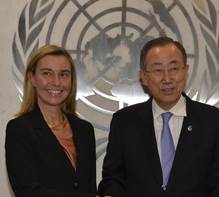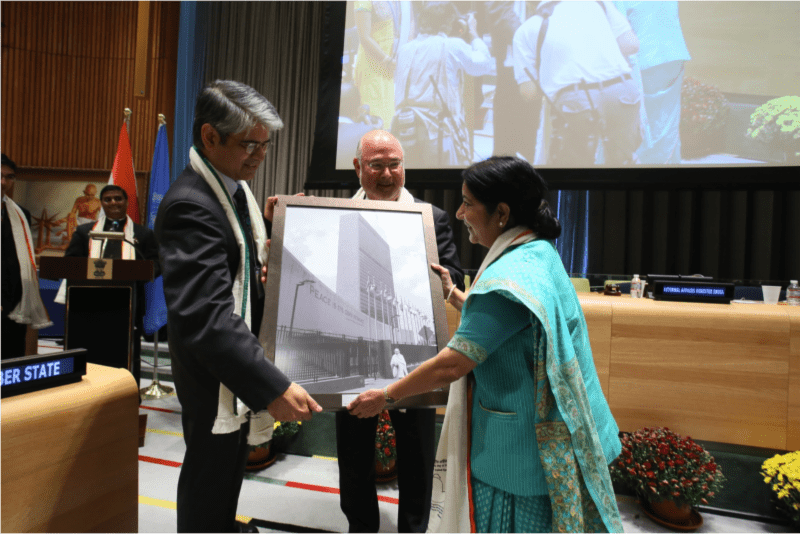Events, reports, and analysis
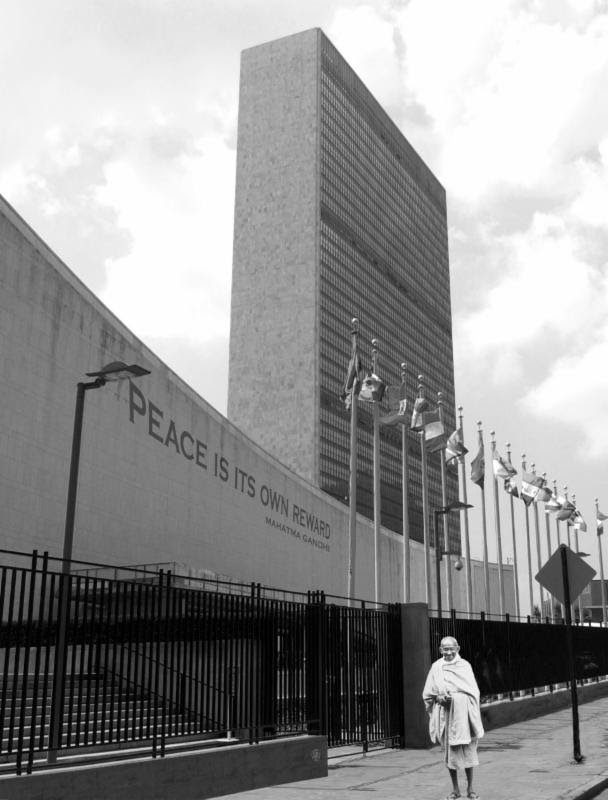 |
|
| Mahatma Gandhi at the United Nations photo credit: Michael Greene |
A Message from the President
On September 26, 2014, the United Nations commemorated the inaugural International Day for the Total Elimination of Nuclear Weapons, established by the General Assembly and endorsement by 129 nations. Tim Wright (on behalf of the International Campaign to Abolish Nuclear Weapons) and I (on behalf of Unfold Zero) were the civil society speakers and we did our best to voice the concerns of billions of people who want progress in eliminating nuclear weapons.
That same day at the United Nations, Secretary of State John Kerry, at the ministerial-level meeting of Friends of the Comprehensive Nuclear-Test-Ban Treaty (CTBT), said that “we are here in pursuit of a very noble goal, and that is to ensure that one day our children and our grandchildren will live in a world where the very real threat of nuclear weapons is a subject to be read about in the history books and not in the newspapers, not as a matter of daily currency,” and he placed achievement of the entry-into-force of the CTBT as “a critical part of our effort to strip the world of these weapons.” This aspiration is consistent with the legal, political, and moral commitment to seek the security of a world without nuclear weapons.
A few days earlier, the New York Times published a shocking article, US Ramping Up Major Renewal in Nuclear Arms. The article posits that, over the next three decades, over $1 trillion will be spent to modernize the US nuclear arsenal. Such committed expenditures will ensure enormous political support and threat for decades, stimulate aspirations of proliferators, and legitimize the ongoing threat to use nuclear weapons, and stimulating similar programs in other countries.
These economic expenditures are inconsistent with the better path to security. The better path is the task to which we will continue to devote our skills and passion.
All of GSI’s programs and efforts are designed to advance threat reducing incremental steps that enhance security and stem proliferation, stimulate progress toward commencing negotiations on the elimination of nuclear weapons and fulfill legal obligations to obtain nuclear disarmament. We do this in a strategically coherent manner by working with decision makers, governments, and networks of organizations that share the same commitments. If you would like to discuss our strategic vision and the policies that emerge from it, please do not hesitate to contact me directly.
We hope this newsletter, which details some of our recent efforts, inspires you to take steps to help rid the world of nuclear weapons and bring about a more stable and realistic approach to global security. If so, please share this newsletter with others.
Please note links and reports to the various prolific activities of our programs, such as the network of Parliamentarians for Nuclear Nonproliferation and Disarmament(PNND) and the Middle Powers Initiative (MPI.)
Sincerely,

Jonathan Granoff
President
United Nations International Day for the Total Elimination of Nuclear Weapons
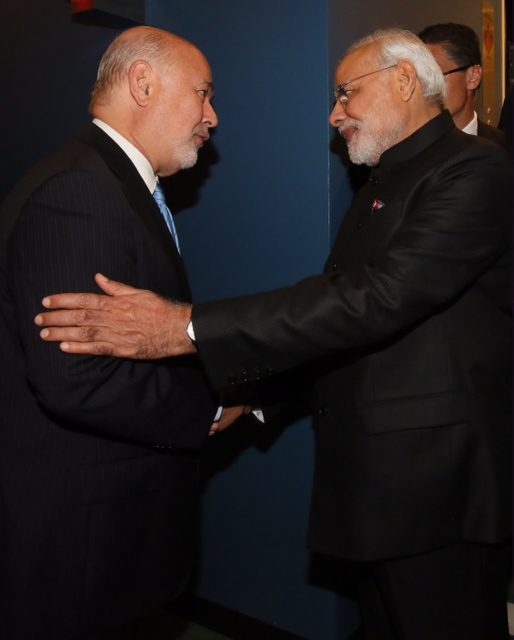 |
|
|
Jonathan Granoff thanking Indian Prime Minister Narendra Modi for India’s call for the universal abolition of nuclear weapons and for the Prime Minister’s inspiring speech at the UN on September 26 |
On September 26, 2014, the United Nations commemorated the inaugural International Day for the Total Elimination of Nuclear Weapons, a day created through the adoption of General Assembly ResolutionA/RES/68/32. Supported by 129 member states, the resolution calls, among other things, for the “urgent commencement of negotiations in the Conference on Disarmament for the early conclusion of a comprehensive convention on nuclear weapons to prohibit their possession, development, production, acquisition, testing, stockpiling, transfer and use or threat of use, and to provide for their destruction.”
Many states–and coalitions of states–delivered speeches at the event, expressing their support for the total elimination of nuclear weapons, as did the Comprehensive Nuclear-Test-Ban Treaty Organization and two civil society coalitions: the International Campaign to Abolish Nuclear Weapons and Unfold Zero.
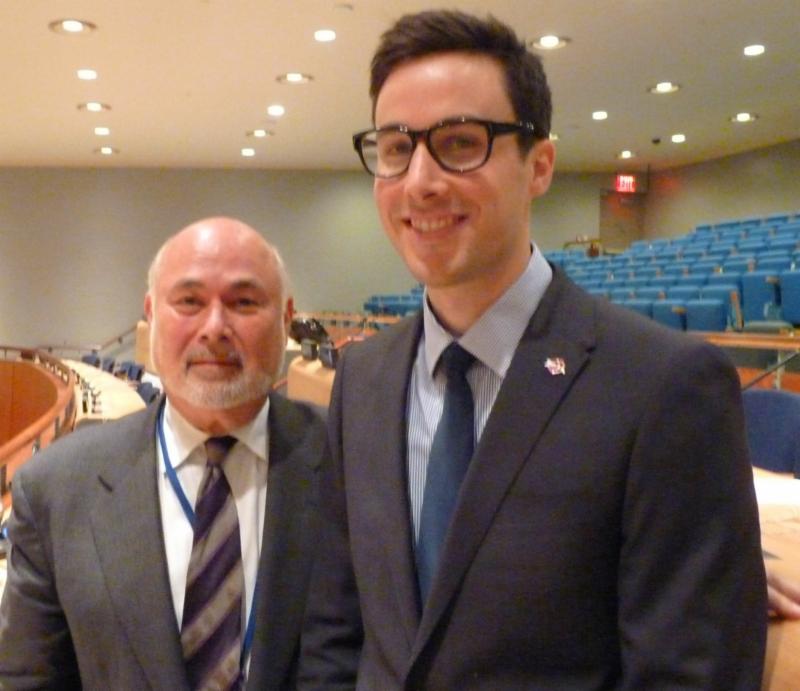 |
|
| Jonathan Granoff with Tim Wright of ICANW |
Jonathan Granoff, who had the privilege of delivering a statement on behalf of Unfold Zero, reiterated the call in resolution 68/32 for such negotiations, but emphasized that such a process need not be limited to just the deadlocked Conference on Disarmament.
“The issue is indeed sufficiently critical that many forums-bilateral, multilateral, regional, and global-at the diplomatic, military, ministerial, high level, and summit level should be devoting time, resources, and skills to moving forward.”
It is particularly worth noting that India, a nuclear-armed state, was amongst the nations speaking in support of our shared goal, affirming their “hope that this important event to commemorate the International Day for the Total Elimination of Nuclear Weapons would enhance public awareness and knowledge about the threat posed to humanity by nuclear weapons and the necessity for their total elimination, in order to mobilize international efforts towards achieving the common goal of a nuclear-weapon-free world.”
Watch Mr. Granoff and Mr. Wright’s remarks:
Middle Powers Initiative Convenes Framework Forum
The Framework Forum was established in 2012 by the Middle Powers Initiative (MPI), a program of the Global Security Institute. Through MPI, seven international non-governmental organizations — the International Physicians for the Prevention of Nuclear War, Albert Schweitzer Institute, Global Security Institute, International Association of Lawyers Against Nuclear Arms, International Network of Engineers and Scientists for Global Responsibility, International Peace Bureau and the Nuclear Age Peace Foundation — are able to work primarily with “middle power” governments to encourage and educate the nuclear weapons states to take immediate practical steps that reduce nuclear dangers, and commence negotiations to eliminate nuclear weapons. Middle power countries are politically and economically significant, internationally respected countries that have renounced the nuclear arms race.
The Framework Forum brings together governments and disarmament experts in track two meetings to support negotiations to achieve a nuclear-weapon-free world. For some events it also brings in key parliamentarians, in collaboration with Parliamentarians for Nuclear Non-Proliferation and Disarmament, in order to build political traction in key countries.
The Forum focuses on implementation of the agreement by states party to the NPT in 2010 that “all States need to make special efforts to establish the necessary framework to achieve and maintain a world without nuclear weapons,” noting “the Five-Point Proposal for Nuclear Disarmament of the Secretary-General of the United Nations, which proposes, inter alia, the consideration of negotiations on a nuclear weapons convention or a framework of separate mutually reinforcing instruments.”
Recent Framework Forum events include:
-
A Framework Forum roundtable, held last month in Geneva, organized by the Basel Peace Office. See Governments and experts meet in ‘Framework Forum’ to discuss key proposals and new initiatives for nuclear disarmament.
-
A joint Framework Forum event, co-hosted with the governments of Japan and the Netherlands at the United Nations on October 22 of this year. See Using “Building Blocks” To Construct a World Free of Nuclear Weapons.
-
Previous Framework Forum roundtables, which have taken place in Vienna, cosponsored by the Austrian government (May 2012), in New York, hosted by the German Mission to the United Nations (Oct. 2012), in Berlin, supported by the German Federal Office of Foreign Affairs (Feb. 2013) and in Geneva, organized by the Basel Peace Office (Aug. 2013.)
The deliberations are supported by expert briefing papers prepared by John Burroughs, Executive Director of the Lawyers’ Committee on Nuclear Policy. (See Middle Powers Initiative releases A Beacon of Hope for the most recent briefing paper).
The Forum also engages States outside the NPT. See, for example, Roche takes Framework Forum proposals to Delhi on Gandhi’s birthday.
PNND and Basel Peace Office Convene OSCE Forum
This past summer, the Basel OSCE Forum on Nuclear Abolition brought together thinkers and policymakers from twenty-four countries to discuss armed conflicts and other security threats, and to explore the capacity of the Organization for Security and Cooperation in Europe (OSCE) to resolve such conflicts, prevent war, and eliminate the reliance on nuclear weapons both in Europe and globally.
The forum, which was organized by PNND and the Basel Peace Office, was attended by mayors, parliamentarians, academics, government officials and representatives of the OSCE, the United Nations, Inter-Parliamentary Union, the International Federation of Red Cross Societies and non-governmental organizations involved in conflict resolution, disarmament and security.
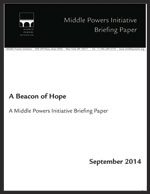 New MPI Briefing Paper: A Beacon of Hope
New MPI Briefing Paper: A Beacon of Hope
Far from extinguishing hopes for progress in nuclear disarmament, the violence-torn summer of 2014– televised killings in Gaza, Ukraine, Syria, and Iraq– should remind us of the inarguable imperative of prohibiting and eliminating nuclear weapons.
The newest brief from the Middle Powers Initiative— a program of the Global Security Institute– puts this imperative into the current political and geostrategic context,and calls for a legal framework to create, verify, and maintain a nuclear weapon-free world.
The brief is being distributed at the United Nations and in relevant capitals through MPI delegations and events.
Read the brief
AREDAY Dialogue with Amory Lovins
The American Renewable Energy Institute’s yearly gathering in Aspen (AREDAY) is one of the world’s most stimulating and inspiring gatherings. Among the most interesting presenters were President Jimmy Carter, Senator Michael Bennet, Ted Turner, T. Boone Pickens, General Wes Clark, Lester Brown, Bill McKibben, Sylvia Earle, Marilyn Tam, and Taj Mahal.
GSI President Jonathan Granoff had the very special privilege of having a dialogue with one of the world’s most creative geniuses, Amory Lovins, whose work with the Rocky Mountain Institute is a model for civil society excellence in effective advocacy. They discussed the relationship between protecting the climate and nuclear weapons policies.
Watch the dialogue
PNND Council Member Appointed to Top Foreign Ministry Post for European Union
|
|
|
|
PNND Council Member Frederica Mogherini assumed the position as EU High Rep. for Foreign Affairs on November 1. |
On August 30, 2014, PNND Council Member Frederica Mogherini was chosen by European leaders to serve as the next High Representative of the European Union for Foreign Affairs and Security Policy.
PNND Council Member Frederica Mogherini assumed the position as EU High Rep. for Foreign Affairs on November 1.
Previously, Ms. Mogherini was the Foreign Minister for Italy. She has been a member of PNND since she first became a member of parliament in 2008, and has served on the PNND Council since 2010. She has spoken at a number of PNND events and led initiatives in the Italian parliament including a resolution adopted unanimously in June 2009 supporting the UN Secretary-General’s Five Point Proposal for Nuclear Disarmament.
At 41, Ms. Mogherini is the youngest Foreign Minister for Italy and hebecame t the youngest EU High Rep. for Foreign Affairs when she assumed office on November 1. She replaced Catherine Ashton, who has been in the post since 2009.
Read the PNND Announcement of her appointment
No Peace among Nations without Peace with Nature
On September 21, an estimated crowd of 300,000 concerned citizens marched the streets of New York City in what was to become the largest climate rally in history. The People’s Climate March brought out hordes of demonstrators in more than 162 countries — all unified in their demand that world leaders address climate change and begin to devise solutions commensurate with the severity and urgency of the threat it poses to our collective existence.
Participating in the New York City march inspired GSI President Jonathan Granoff to publish the following musings in the Huffington Post, where he asserted the linkage between the fight for a sustainable environment and the fight against nuclear weapons:
“We love this Earth that God created. That is why we were in the streets of Manhattan this weekend. And without this peace with nature, there can be no peace among nations. The grand, collective madness that is burning the world is a shape-shifting lunacy with a variety of forms that must be discerned and healed wherever it exists. The very existence of thousands of nuclear bombs prepared to rain fire and death proposes another, perhaps more terrible burning of our Holy Mother Earth by our own choice.”
Read “Save Earth’s Holy Bible,” in Huffington Post
Op/ed: The Major Powers Must Unite Behind the UN
by Douglas Roche, O.C., Chairman Emeritus of the MIddle Powers Initiative
This article was originally published in Embassy magazine, September 17, 2014. Special thanks go to Jim Creskey, Editor, for his courtesy in permitting us to share the article.
Outside, the headlines blared the new war on the ISIS extremists in Syria and Iraq, but inside the United Nations headquarters in New York, the focus was on building a culture of peace and forging an agenda to wipe out the worst forms of poverty by 2030.
Destroy. Create.
The tensions inside me were fierce as I watched debates play out in the one place charged by international law to protect the peace and security of the world.
Continue reading MPI Chairman Emeritus’s op/ed.
International Day of Nonviolence
|
|
|
Above: Mr. Granoff presenting the gift to India’s Minister of External Affairs, Ms. Sushma Swaraj, on the occasion of the International Day of Nonviolence. Also pictured: Ambassador Asoke K. Mukerji, Permanent Representative of India to the UN, and Prakash Gupta, First Secretary of India’s UN Mission. |
On October 2, 2014, leaders from around the world gathered in the Trusteeship Council at the UN Headquarters to observe the International Day of Non-violence, in an event sponsored by the Permanent Mission of India. The idea for the day, which is held annually on the birthday of Mahatma Gandhi, originally came from Nobel Peace Prize winner Shirin Ebadi and was established by the General Assembly in 2007.
According to the resolution that established the commemoration (A/RES/61/271), the day is an occasion to “disseminate the message of nonviolence, including through education and public awareness.” The resolution reaffirms “the universal relevance of the principle of nonviolence” and the desire “to secure a culture of peace, tolerance, understanding and nonviolence.”
At this year’s commemoration of the Day, on behalf of the Global Security Institute, GSI President Granoff presented a gift to India in honor of their late leader’s contributions to a safer and more cooperative world. India’s Minister of External Affairs, Sushma Swaraj, accepted the gift on behalf of the Indian government.
The gift from the Global Security Institute was created by the renowned artist Michael Green to emphasize that the influence of Gandhi is universal and to reflect on what he would have said had he lived to come to the United Nations.
–Read the article on the day’s commemoration from Firstpost India
–Read the statement delivered at the event by the Netherlands
-See the UN Event Report
–Watch the event on UNTV
11 Days of Global Unity: Disarmament
In 2004, th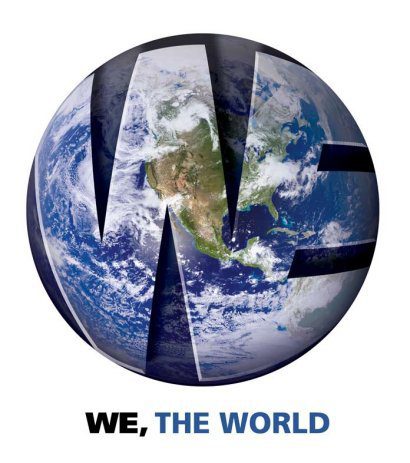 e organization We, The World, along with its global partners launched 11 Daysof Global Unity — a web-based campaign with the intention of growing local awareness and action campaigns into an inspiring international movement. This year, GSI President Jonathan Granoff was honored to speak on the 10th day of the Summit on the topic of disarmament.
e organization We, The World, along with its global partners launched 11 Daysof Global Unity — a web-based campaign with the intention of growing local awareness and action campaigns into an inspiring international movement. This year, GSI President Jonathan Granoff was honored to speak on the 10th day of the Summit on the topic of disarmament.


